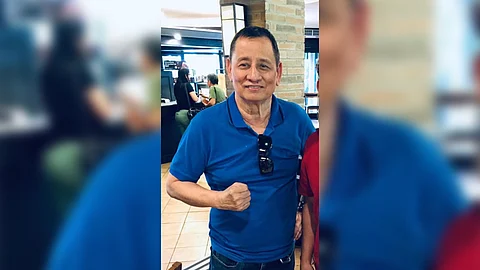
- NEWS
- the EDIT
- COMMENTARY
- BUSINESS
- LIFE
- SHOW
- ACTION
- GLOBAL GOALS
- SNAPS
- DYARYO TIRADA
- MORE

Michael Corleone, the central figure in The Godfather, summed it up perfectly.
“Just when I thought I was out, they pull me back in,” he said in the finale of the trilogy.
That’s exactly what has happened repeatedly to boxing promoter Dante Almario, who swears his involvement in boxing is going to last forever.
“Many times, boxing was starting to distance itself from me. But every time I was on the brink of getting out, I always end up getting back.”
Almario, now 74 and whose association with the fight game stretches back to the 1980s, said “it’s hard to get away from boxing.”
It’s not that boxing’s dark side draws him back but the sport’s unrivaled allure that keeps Almario from getting involved.
Almario was born in Muntinlupa City and studied at Lyceum and then at PMI before finding himself working at customs.
But his being active in his barangay was the reason why he got addicted to boxing.
“I wanted to incorporate sports in our barangay to help the youth and also prevent them from getting involved in illegal activities.”
So, since he lives near Sucat in Parañaque, it was unavoidable that he would cross paths with the Philippines’ foremost name in boxing: The Elordes.
While he dealt with the Elordes, Almario struck a lasting friendship with the Lope “Jun” Sarreal, son of the Hall of Fame promoter Lope “Papa” Sarreal.
Sarreal was the father-in-law of the great Gabriel “Flash” Elorde, whose sons and daughters remain involved in boxing up to this day.
He served as manager of some of the best fighters of the 1980s and even in the 1990s and well into the not-so-distant past, handling the careers of former world title challengers Ari Blanca and Toto Landero.
Blanca vied for the World Boxing Association (WBA) junior-bantamweight title in March 1990 against Thai legend Khaosai Galaxy in Bangkok.
Blanca decked the massive favorite in the first round but melted away in the fifth frame.
Landero was also one of Almario’s main men but his shot at the WBA minimumweight diadem also ended in defeat in 2018.
“A world title is something that is not automatic even if you have been in boxing for a long time,” said Almario, who, despite his inability to join an elite cast of managers, still continues to lend a hand to boxing.
In fact, Almario spearheaded the staging of a Christmas party for boxers and ex-boxers last week with some of the country’s renowned fight figures in attendance.
“It’s one way of giving back to the No. 1 figure in the boxing game — the boxers,” added Almario, who established the PBF in Cebu City in the early-1990s.
Until now, the PBF sanctions title fights in just about every province around the country.
As he enters the twilight of his career, Almario has accepted the fact that it doesn’t seem likely that somebody’s going to walk over to him and becomes a world champion.
But that doesn’t stop Almario from extending a helping hand.
In fact, he is leading a move by the Philippine boxing community to convince lawmakers to pass a law that will benefit boxers who have become world champions to receive a cash reward similar to what national athletes are getting whenever they win medals not just in the Olympics but on other fronts as well.
“It is high time that the public and our lawmakers be aware that it doesn’t follow that winning a world boxing title will automatically put an end to the hardships of the boxer and his family and loved ones,” he said.
“Many of our ex-world champions are living a life of poverty not because they threw their money away. No, because not everyone end up getting huge paychecks. And that purse itself is subjected to deductions from the manager, trainer, cutman and other members of his team.”
Almario reveals that he has reached out to the leadership of the Games and Amusements Board about this and was told that the agency is going to see what help it can provide.
“I am not against our national athletes receiving financial rewards from the government but professional boxing is a very dangerous game unlike amateur boxing or some other sport. Lives are at stake and life can be taken away in an instant.”
Almario is not losing hope that such an undertaking will become a law someday.
And if that happens, he’s the guy Philippine boxing should be thankful for.
